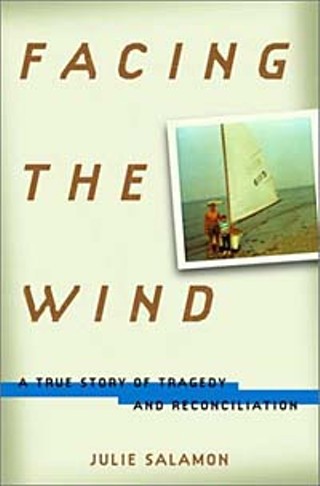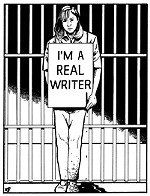Summer Reading
By Suzy Spencer, Fri., June 1, 2001

Facing the Wind: A True Story of Tragedy and Reconciliation
by Julie SalamonRandom House, 302 pp., $24.95
I would have loved to have heard the pitch for Julie Salamon's Facing the Wind, a true crime. I can hear the marketing staff saying, "Are there any really gory photos?"
"No."
"Any really kinky sex?"
The acquisitions editor proposing the book looks down and says, "No."
The sales staff groans. "Well, what's the book about?"
"There were these families with handicapped children and ..."
"Next up!"
"No, see, it's really good. They -- "
"Who's the target market? No true crime reader is going to read a book without gory photos and kinky sex. And no one wants to read about handicapped kids."
"But the author is a New York Times bestseller. She's written for Vogue, The New Yorker, and The New Republic."
The sales manager leans in. "Hmm? Handicapped kids. Does it have Oprah potential?"
"Uh, I don't know. Probably not. But the author is a former Wall Street Journal reporter and is now a television critic for The New York Times."
"New York Times. Wall Street Journal. That means we can get good reviews. How much does she want?"
In other words, a first-time author would have never sold this book about Bob Rowe, an upper-middle-class New York attorney who took his eldest son's baseball bat and politely (so as to make sure there is no pain) whacked his son across the brain, once to kill him, twice to make sure he wasn't simply brain damaged, then rested before proceeding to do the same to his adopted daughter, severely handicapped son, and hardworking and devoted wife. That does not mean, though, that Facing the Wind is not a compelling read. The attorney successfully pleaded insanity, and not long thereafter Rowe was free as a bird, sleeping with a failed nun 30 years his junior.
Since Facing the Wind is a Random House hardback, the book is never described or promoted in such tabloid terms. It's called a "true story of tragedy and reconciliation," "a work of redemptive insight and compassion," and, according to the book flap, "It asks us to ... look at our own lives and our own problems in the new, bright light that good writing always sheds."
The first 20 pages are rather flat. But sometimes, I know, murders are so brutal that the writing must be understated. If not, the depiction becomes overwhelming, even over the top, and unbelievable. Salamon occasionally punctuates her strict journalistic style with vividness: "The air stank of sour milk and shit." She then quickly backtracks to writing that sounds more casebook than true crime.
For the most part, it works ... like drinking a hand-mixed margarita with dinner: You don't realize how potent the concoction is until you try to stand up. Facing the Wind has its greatest impact after it's had time to seep into one's system.
But I didn't find myself asking the hifalutin questions the book jacket begs a reader to ask ... or contemplating the never-ceasing stress of being a parent of a handicapped child. I asked, "How in the hell can they call this a book about reconciliation? There is no reconciliation. I'm angry and distraught that this man walked away free." Bob Rowe's only punishment was that he wasn't allowed to practice law, which he spent his last two decades trying to do. In fact, he wasn't disbarred until approximately 20 years after he slammed the bat into the heads of his children and wife ... slammed it out of love, he claimed. He didn't want his wife and children to suffer the shame of his alleged mental illness and resulting inability to earn a living.
The women in his wife's support group for parents of handicapped children -- women who had admired and loved Bob Rowe for his active participation in his handicapped son Christopher's life -- carried similar animosity. In fact, Salamon spends an inordinate amount of time focusing on these women and their children. At times, it seems to distract from the story. But Salamon apparently has a purpose in doing this -- to help the readers understand how deeply a parent can love a handicapped child. It is with these children that her passion overpowers her journalism: "Rose thought about the baby's legs, no bigger than an adult's finger, poked with needles so often that Rose half expected her to start spraying like a water sprinkler when they put anything into her, like a cartoon character."
Salamon's passion also shows up in her compassionate depiction of Bob Rowe as he begs a next-door neighbor to tie him up, "'Before I do something terrible.'" She even resorts to the terminology that Bob and his remaining friends used in describing the horrific murders -- the "incident" or the "tragedy."
By the time the book ends -- and Salamon apparently believes the support-group moms who so loved the Rowe family have had their reconciliation -- one almost forgets the things Bob Rowe said before his "insanity" took hold of his soul: "Our major theme has been that we are going to be happy, and if we can be happy with Christopher, great. If we can't be happy with Christopher, if he is going to be a tragedy, if he is going to make a tragedy of our life and our family, then he has to go."
Not only Christopher went, but so did his older brother, younger sister, and mom. The only one who didn't go was Bob Rowe. Indeed, in his 60s, Bob Rowe fathered a healthy daughter with the dropout nun 30 years his junior. Seems to me, he wasn't the one who needed to plead insanity. But as any of the many devout Catholics in this book may have said, "All things work for good for those who love the Lord and try to do His will."
Suzy Spencer is the author of two true crime books, Wasted and Wages of Sin.







